- Home
- L. Frank Baum
Aunt Jane's Nieces in Society Page 2
Aunt Jane's Nieces in Society Read online
Page 2
CHAPTER II
A QUESTION OF "PULL"
John Merrick's face was not so cheery as usual as he made his way intothe city. This suggestion of Martha Merrick's regarding his inattentionto duty to his beloved nieces was no easy nut to crack.
He knew his sister-in-law to be a wordly-minded, frivolous woman, withmany trivial ambitions; but in this instance he had misgivings that shemight be right. What did he, John Merrick, know of select society? Apoor man, of humble origin, he had wandered into the infantile, embryoWest years ago and there amassed a fortune. When he retired and returnedto "civilization" he found his greatest reward In the discovery of threecharming nieces, all "as poor as Job's turkey" but struggling alongbravely, each in her individual characteristic way, and well worthytheir doting uncle's affectionate admiration. Mrs. Merrick had recitedsome of the advantages they had derived from the advent of this richrelative; but even she could not guess how devoted the man was to thewelfare of these three fortunate girls, nor how his kindly, simple heartresented the insinuation that he was neglecting anything that mightcontribute to their happiness.
Possession of money had never altered John Merrick's native simplicity.He had no extravagant tastes, dressed quietly and lived the life of thepeople. On this eventful morning the man of millions took a cross-towncar to the elevated station and climbed the stairs to his train. Onceseated and headed cityward he took out his memorandum book to see whatengagements he had for the day. There were three for the afternoon. Attwelve o'clock he had promised to meet Von Taer.
"H-m-m. Von Taer."
Gazing reflectively from the window he remembered a conversation with aprominent banker some month or so before. "Von Taer," the banker hadsaid, "is an aristocrat with an independent fortune, who clings to thebrokerage business because he inherited it from his father andgrandfather. I hold that such a man has no moral right to continue inbusiness. He should retire and give the other fellow a chance."
"Why do you call him an aristocrat?" Mr. Merrick had enquired.
"Because his family is so ancient that it shames the ark itself. Iimagine his ancestors might have furnished Noah the lumber to build hisship. In New York the '400' all kowtow to Von Taer."
"Seems to me he has the right to be a broker if he wants to," assertedMr. Merrick.
"The right; yes. But, between us, Mr. Merrick, this society swell has nomental capacity to handle such an uncertain business. He's noted fordoing unwarranted things. To me it's a marvel that Von Taer hasn'tshipwrecked the family fortunes long ago. Luck has saved him, notforesight."
That speech of a few weeks ago now seemed prophetic to John Merrick.Within a few days the aristocratic broker had encountered financialdifficulties and been forced to appeal to Mr. Merrick, to whom heobtained an introduction through a mutual friend. Von Taer wasdoubtless solvent, for he controlled large means; but unless a savinghand was extended at this juncture his losses were sure to be severe,and might even cripple him seriously.
All this Mr. Merrick shrewdly considered in the space of a few moments.As he left the train he looked at his watch and found it was barelyeleven. He decided not to await the hour of appointment. With his usualbrisk stride he walked to Von Taer's offices and was promptly admittedto the broker's sanctum.
Hedrik Von Taer was a fine looking man, tall, grave, of dignifieddemeanor and courteous manners. He stood until his visitor was seatedand with a gesture of deference invited him to open the conversation.
"I've decided to make you the loan, Von Taer," began Mr. Merrick, in hispractical, matter-of-fact way. "Three hundred thousand, wasn't it? Callon Major Doyle at my office this afternoon and he'll arrange it foryou."
An expression of relief crossed the broker's face.
"You are very kind, sir," he answered. "I assure you I fully appreciatethe accommodation."
"Glad to help you," responded the millionaire, briskly. Then he pausedwith marked abruptness. It occurred to him he had a difficultproposition to make to this man. To avoid the cold, enquiring eyes nowfixed upon him he pulled out a cigar and deliberately cut the end. VonTaer furnished him a match. He smoked a while in silence.
"This loan, sir," he finally began, "is freely made. There are nostrings tied to it. I don't want you to feel I'm demanding any sort ofreturn. But the truth is, you have it in your power to grant me afavor."
Von Taer bowed.
"Mr. Merrick has generously placed me under an obligation it will affordme pleasure to repay," said he. But his eyes held an uneasy look,nevertheless.
"It's this way," explained the other: "I've three nieces--fine girls,Von Taer--who will some day inherit my money. They are alreadyindependent, financially, and they're educated, well-bred and amiableyoung women. Take my word for it."
"I am sure your statements are justified, Mr. Merrick." Yet Hedrik VonTaer's face, usually unexpressive, denoted blank mystification. Whatconnection could these girls have with the favor to be demanded?
"Got any girls yourself, Von Taer?"
"A daughter, sir. My only child.
"Grown up?"
"A young lady now, sir."
"Then you'll understand. I'm a plain uneducated man myself. Never beenany nearer swell society than a Fifth Avenue stage. My money has givenme commercial position, but no social one worth mentioning. Your '400's'a bunch I can't break into, nohow."
A slight smile hovered over the other's lips, but he quickly controlledit.
"They tell me, though," continued the speaker, "that _your_ family haslong ago climbed into the top notch of society. You're one o' the bigguns in the battery, an' hold the fort against all comers."
Von Taer merely bowed. It was scarcely necessary to either admit orcontradict the statement. Uncle John was a little indignant that hiscompanion showed no disposition to assist him in his explanation, whicha clear head might now easily comprehend. So, with his usual frankness,he went directly to the point.
"I'd like my girls to get into the best--the most select--circles," heannounced. "They're good and pretty and well-mannered, so it strikes methey're entitled to the best there is a-going. I don't want to mix withyour swell crowd myself, because I ain't fit; likewise the outfit ain'tmuch to my taste, askin' your pardon; but with women it's different.They need to stand high an' shine bright to make 'em really happy, andif any special lot is particularly ex-clusive an' high-falutin', that'sthe crowd they long to swarm with. It's human nature--female humannature, anyhow. You catch my idea, Von Taer, don't you?"
"I think so, Mr. Merrick. Yet I fail to see how I can be of service toyou in gratifying the ambition of your charming nieces." "Then I'llgo, and you may forget what I've said." The visitor arose and took hishat from the table. "It was only a fool notion, anyway; just a thought,badly expressed, to help my girls to a toy that money can't buy."
Hedrik Von Taer gazed steadily into the man's face. There was somethingin the simple, honest self-abnegation of this wealthy and importantperson that won the respect of all he met. The broker's stern eyessoftened a bit as he gazed and he allowed a fugitive smile, due to hisown change of attitude, to wreathe his thin lips again--just for aninstant.
"Sit down, please, Mr. Merrick," he requested, and rather reluctantlyUncle John resumed his seat. "You may not have an especially clear ideaof New York society, and I want to explain my recent remark so that youwill understand it. What is called 'the 400' may or may not exist; butcertainly it is no distinct league or association. It may perhaps beregarded as a figure of speech, to indicate how few are really admittedto the most exclusive circles. Moreover, there can be no dominant'leader of society' here, for the reason that not all grades of societywould recognize the supremacy of any one set, or clique. These cliquesexist for various reasons. They fraternize generally, but keep wellwithin their own circles. Kindred tastes attract some; ancient lineageothers. There is an ultra-fashionable set, a sporting set, a literaryset, an aristocratic set, a rather 'fast' set, a theatrical set--and soon. These may all lay claim with certain justice to membership i
n goodsociety. Their circles are to an extent exclusive, because somedistinction must mark the eligibility of members. And outside eachluminous sphere hovers a multitude eager to pass the charmed circle andso acquire recognition. Often it is hard to separate the initiate fromthe uninitiate, even by those most expert. Is it difficult to comprehendsuch a condition as I have described, Mr. Merrick?"
"Somewhat, Mr. Von Taer. The wonder to me is why people waste time insuch foolishness."
"It is the legitimate occupation of many; the folly of unwise ambitionimpels others. There is a fascination about social life that appeals tothe majority of natures. Let us compare society to a mountain whosesides are a steep incline, difficult to mount. To stand upon thesummit, to become the cynosure of all eyes, is a desire inherent,seemingly, in all humanity; for humanity loves distinction. In thescramble toward the peak many fall by the wayside; others deceivethemselves by imagining they have attained the apex when they are farfrom it. It is a game, Mr. Merrick, just as business is a game, politicsa game, and war a game. You know how few really win."
"Here," said Uncle John, musingly, "is a philosophy I did not expectfrom you, Von Taer. They tell me you're one who stands on top the peak.And you were born that way, and didn't have to climb. Seems to me yourather scorn the crowd that's trying to climb to an eminence you neverhad to win. That wouldn't be my way. And I suspect that if the crowdwasn't trying to climb to you, your own position wouldn't be worth acotton hat."
Von Taer had no answer to this criticism. Perhaps he scarcely heard it,for he appeared lost in a brown study. Finally he said: "Will youpermit my daughter to call upon your nieces, Mr. Merrick?"
"Of course, sir."
"Then kindly give me their addresses."
Uncle John wrote them on a slip of paper.
"You may now dismiss the subject from your mind, sir, as you latelyadvised me to do. Whatever may be accomplished in the direction you havesuggested I will gladly undertake. If I succeed it will be exceedinglygratifying to us all, I am sure."
Mr. Merrick left the office in a rather humbled and testy mood. Hedisliked to ask favors at any time and now felt that he had confidedhimself to the mercy of this callous aristocrat and met with a distinctrebuff.
But he had done it for the sake of his beloved nieces--and they wouldnever know what humiliation this unsatisfactory interview had cost him.

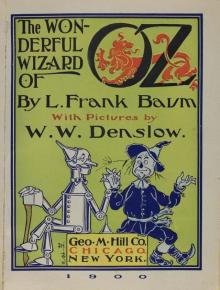 The Wonderful Wizard of Oz
The Wonderful Wizard of Oz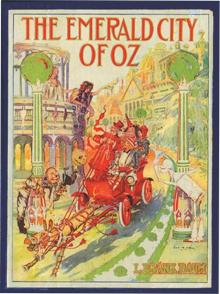 The Emerald City of Oz
The Emerald City of Oz The Story of Peter Pan, Retold from the fairy play by Sir James Barrie
The Story of Peter Pan, Retold from the fairy play by Sir James Barrie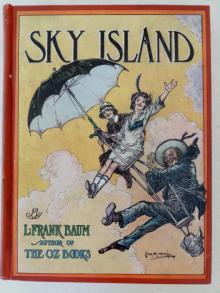 Sky Island
Sky Island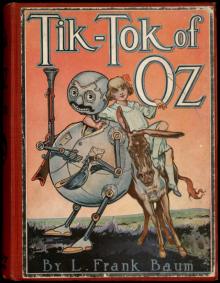 Tik-Tok of Oz
Tik-Tok of Oz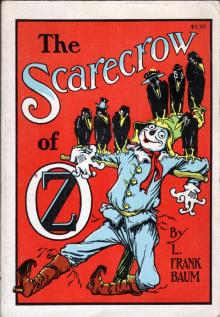 The Scarecrow of Oz
The Scarecrow of Oz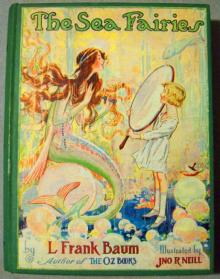 The Sea Fairies
The Sea Fairies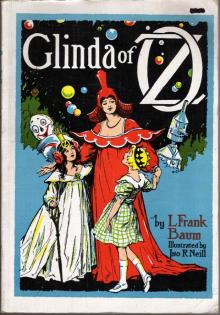 Glinda of Oz
Glinda of Oz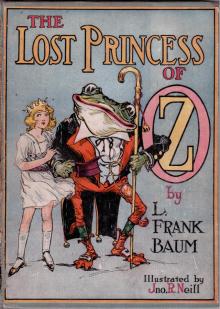 The Lost Princess of Oz
The Lost Princess of Oz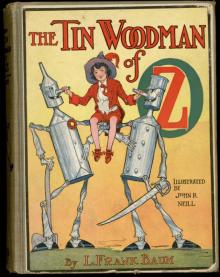 The Tin Woodman of Oz
The Tin Woodman of Oz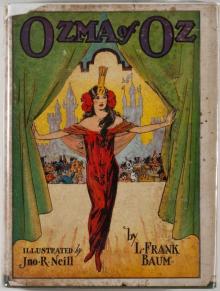 Ozma of Oz
Ozma of Oz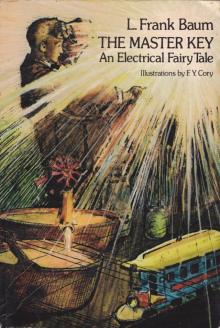 The Master Key
The Master Key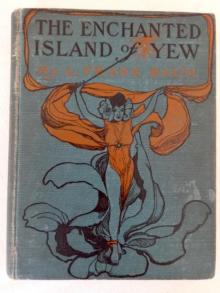 The Enchanted Island of Yew
The Enchanted Island of Yew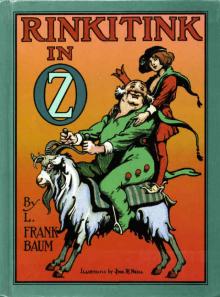 Rinkitink in Oz
Rinkitink in Oz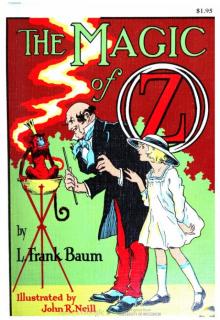 The Magic of Oz
The Magic of Oz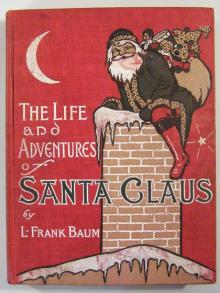 The Life and Adventures of Santa Claus
The Life and Adventures of Santa Claus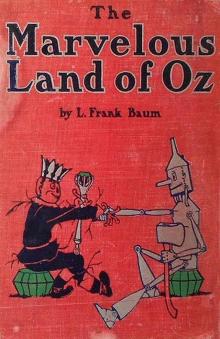 The Marvelous Land of Oz
The Marvelous Land of Oz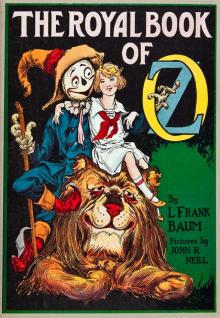 The Royal Book of Oz
The Royal Book of Oz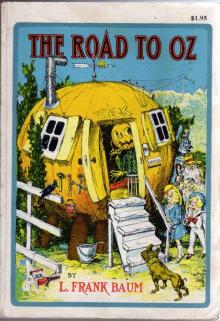 The Road to Oz
The Road to Oz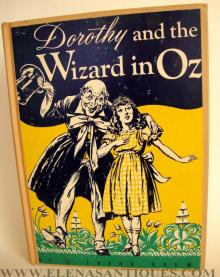 Dorothy and the Wizard in Oz
Dorothy and the Wizard in Oz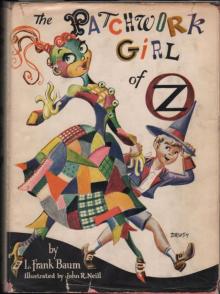 The Patchwork Girl of Oz
The Patchwork Girl of Oz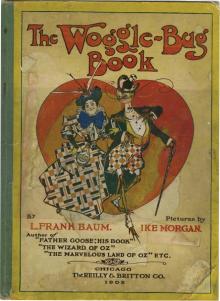 The Woggle-Bug Book
The Woggle-Bug Book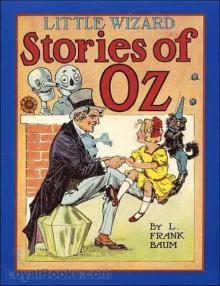 Little Wizard Stories of Oz
Little Wizard Stories of Oz Yankee in Oz
Yankee in Oz Aunt Jane's Nieces and Uncle John
Aunt Jane's Nieces and Uncle John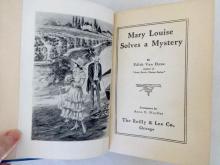 Mary Louise
Mary Louise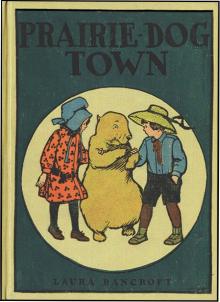 Prairie-Dog Town
Prairie-Dog Town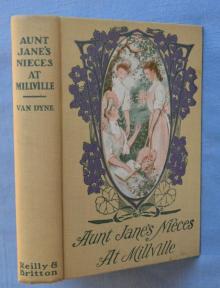 Aunt Jane's Nieces at Millville
Aunt Jane's Nieces at Millville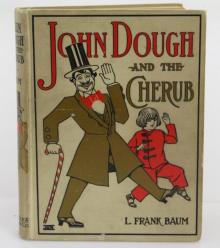 John Dough and the Cherub
John Dough and the Cherub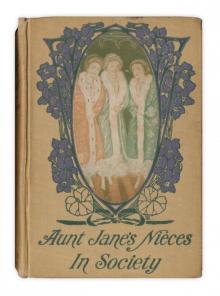 Aunt Jane's Nieces in Society
Aunt Jane's Nieces in Society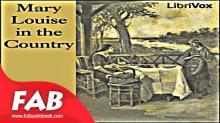 Mary Louise in the Country
Mary Louise in the Country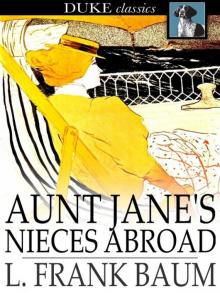 Aunt Jane's Nieces Abroad
Aunt Jane's Nieces Abroad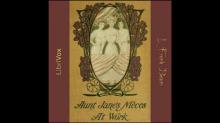 Aunt Jane's Nieces at Work
Aunt Jane's Nieces at Work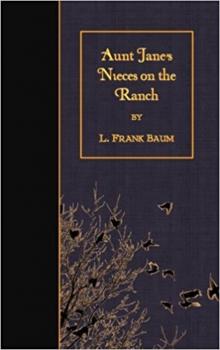 Aunt Jane's Nieces on the Ranch
Aunt Jane's Nieces on the Ranch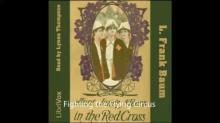 Aunt Jane's Nieces in the Red Cross
Aunt Jane's Nieces in the Red Cross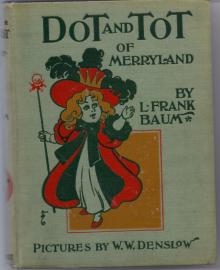 Dot and Tot of Merryland
Dot and Tot of Merryland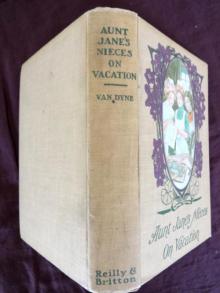 Aunt Jane's Nieces on Vacation
Aunt Jane's Nieces on Vacation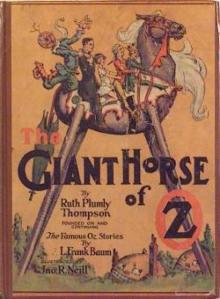 The Giant Horse Of Oz
The Giant Horse Of Oz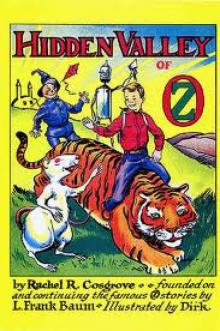 The Hidden Valley of Oz
The Hidden Valley of Oz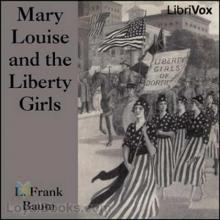 Mary Louise and the Liberty Girls
Mary Louise and the Liberty Girls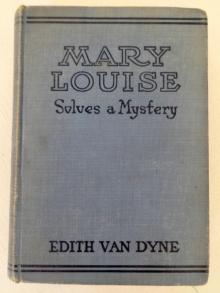 Mary Louise Solves a Mystery
Mary Louise Solves a Mystery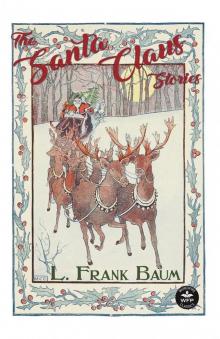 The Santa Claus Stories
The Santa Claus Stories Aunt Judith: The Story of a Loving Life
Aunt Judith: The Story of a Loving Life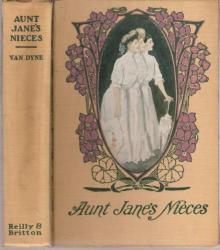 Aunt Jane's Nieces
Aunt Jane's Nieces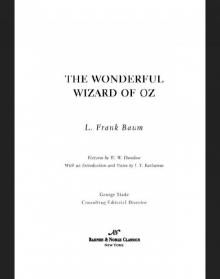 Wonderful Wizard of Oz (Barnes & Noble Classics Series)
Wonderful Wizard of Oz (Barnes & Noble Classics Series) Oz, The Complete Collection
Oz, The Complete Collection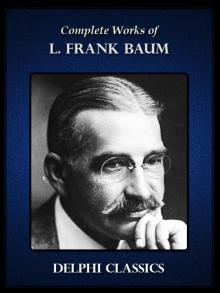 Complete Works of L. Frank Baum
Complete Works of L. Frank Baum The Wizard of Oz
The Wizard of Oz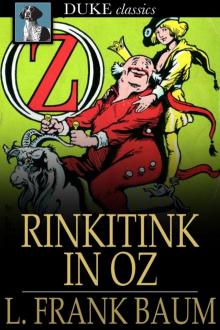 Oz 10 - Rinkitink in Oz
Oz 10 - Rinkitink in Oz